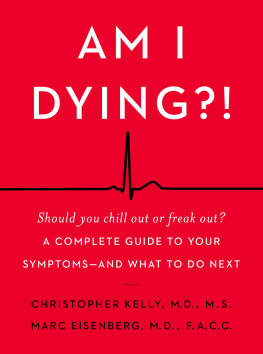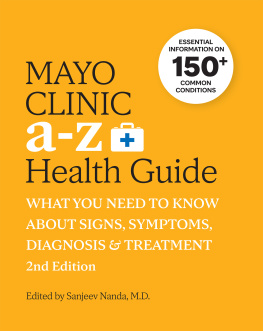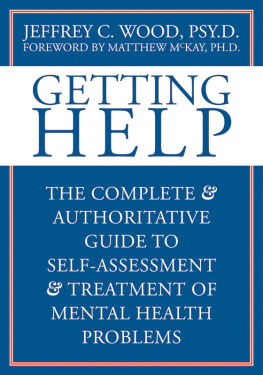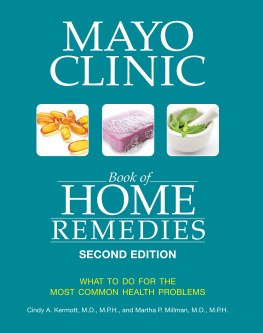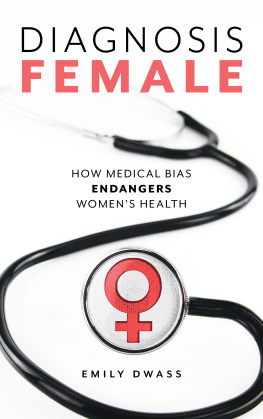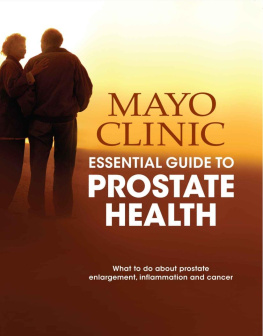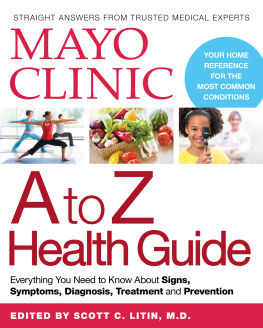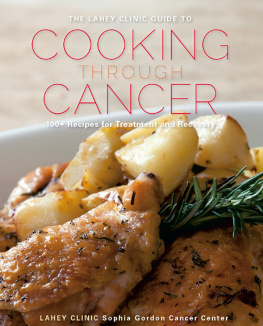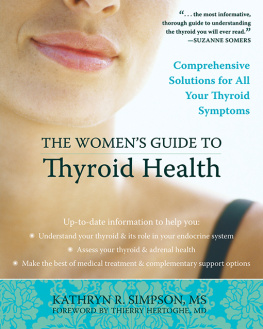To Leah, Becks, Blair, and Bryce.
To my mom, Hannah; my dad, Alan; and my four-legged Max.
For your endless love and support, I am always grateful.
I ts the one question our patients really want answered. The one that gnaws at them at night, that prompts them to make an appointment for the first time in years. The one that keeps them from ignoring that weird new symptom thats probably nothing, butOMG what if it isnt nothing, and what if its an early sign of something serious, and this is totally something that would happen to me?
AM I DYING?!
The answer, of course, is... yes. From the moment you were born! The real question is: Will it be sooner than you had expected?
Thankfully most new symptoms turn out to be no big deal. Sometimes, however, a headache isnt just a headache, and its actually a sign of a life-threatening condition, like bleeding around your brain. In the middle of the night, even just a 1 percent chance of a terrible outcome starts to feel like a 98 percent chance. None of us wants to ignore a problem that could spell our doom.
So if you have a new symptom, should you freak out or chill out? Are you acting like a hypochondriac or being totally reasonable? In this book, well go through the most common symptoms and provide guidance on the next stepswhether to pour yourself a cocktail, pick up the phone to make an appointment, or hightail it to the emergency room.
Of course, you could just Google your symptoms. Go ahead, try it. Well wait. Oh, it says your stuffy nose is a sign of cancer? Wow. Our condolences. (By the way, where did Dr. Google go to medical school?)
It turns out that most websites intentionally whip their readers into a panic just so theyll keep clicking around or shell out cash for a miracle cure. We, on the other hand, tell it like it is. Youll get the same advice we offer our family members (at least, the ones we like). Most of the time, you can go ahead and pour that cocktail.
Of course its impossible to cover every scenario, and this book may not address your exact situation. When in doubt, ask a doctor. Also, unless we state otherwise, we assume youre a generally healthy adult who doesnt already have a diagnosis directly related to your symptoms. If you have severe chest pain and just had heart surgery two weeks ago, please call your doctor! Dont bring us into it! If youre a precocious twelve-year-old reading this book, please note that it doesnt really cover children or adolescents (but stay tuned for the sequel). Finally, if we recommend a medication but you know youre allergic, please dont take it! (Would you follow your GPSs directions into a lake?)
We hope our advice is useful and that you get the help (or reassurance) that you need. If youd like to share your stories with us or have ideas for a new chapter, please visit us at www.amidying.com or write to docs@amidying.com.
M ost of us know that familiar pounding sensation that occurs at the end of a long week, when the coffee is no longer helping, the walls are closing in, and you start looking for the nearest desk to crawl under. A bad headache is often the answer to that nagging question: How can this day get any worse?
But what if this headache is different? What if its... the big one? What if your boss, your spouse, or your kids finally made that aneurysm burst, just like you always said they would?
Before you panic, lets pause to review the facts. Many people have experienced headaches severe enough to go to the E.R.; in fact, one in fifty E.R. visits is about headaches. And yet, most of those people survive, and you (probably) will too. As Arnold Schwarzenegger once said: Its not a toomah!
Or is it? Sometimes headaches are the first sign of an underlying medical problem, possibly even a life-threatening one. In addition, many people suffer unnecessarily from recurring headaches that would improve with the correct treatment. So how can you tell if its time to get your noggin checked?
Take a Chill Pill
Your headache is mostly in your forehead or face and youve recently had symptoms of a cold, like a fever and runny nose. One of your sinuses is probably jammed with mucus and too swollen to properly drain. You can try to thin out the mucus by inhaling warm vapor. If youre brave, use a neti pot to directly flush your sinuses. (We recommend not doing this in front of anyone youd ever like to see again.) Finally, you can take ibuprofen/Advil/Motrin along with a decongestant like pseudoephedrine or phenylephrine, found in products like Sudafed and Dayquil. (Youll need to show ID, such as a drivers license, to purchase products containing pseudoephedrine, since sales are limited because it can be converted into crystal methamphetamine, or meth.) If the pain gets steadily worse and lasts for more than a week, you might need antibiotics; make an appointment to see your doctor.
You also have fever, body aches, muscle aches, and a sore throat. You probably have the flu. Unfortunately, even the flu vaccine cant provide absolute protection from infection. If your symptoms started less than two days ago, you can call your doctor for a prescription of oseltamivir/Tamiflu, which may shorten your illness. (The treatment is less effective if started later.) Otherwise, the best treatment is rest, plenty of fluids, and acetaminophen/Tylenol.
You recently kicked your coffee habit. Did you ever think you would be diagnosed as being in withdrawal? Wellcongratulations! Caffeine is often used to treat headaches, but going cold turkey can actually lead to withdrawal headaches. Youll need to ride this out, perhaps with the help of a pain reliever, like ibuprofen/Advil/Motrin.
Your headache feels like a band around your skull but gets better with rest and medications like acetaminophen/Tylenol. These symptoms are typical for a tension headache, the most common and least dangerous headache type. The name is spot-on for two reasons. First, it feels like tension or pressure around your head. Second, its brought on by tension in your lifelike stress and lack of sleep. These headaches dont require medical attention unless theyre happening often enough to interfere with your life.
The pain is uncomfortable but not intolerable, came on gradually, and isnt associated with any other symptoms. Some headaches dont fit any specific pattern but also dont have any alarming features. Take a pain reliever with a tall glass of water and lie down in a quiet room. Give the medicine at least an hour or two to work. You should feel better soon. If the pain keeps getting worse or becomes more regular, take a look through the next sections.
Make an Appointment
Youre having frequent or intense headaches now, but never used to before. High levels of stress, poor sleep, or a sudden decrease in caffeine intake can cause new-onset headaches in a person who doesnt normally have them. If theres no obvious explanation, however, you should see your doctor. Depending on your headache pattern, you may need some tests. People who are older than fifty or have immune compromise (like from HIV infection or chemotherapy) are at higher risk of having a serious problem.

